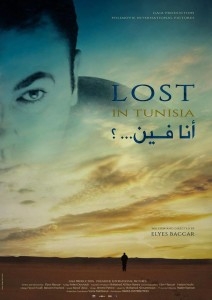Many people for the premiere of the film “Ana end” or “Lost in Tunisia” at the opening of the 4th edition of the International Human Rights Film Festival.
This documentary film, written and directed by Elyes Baccar shows the contrasts of Tunisia according to Revolution, insisting more particularly on women. This beating Tunisian, modern and traditional at the same time, which claims its rights and fights to preserve them, but at the same time is its culture and customs, present everywhere, at home, at work, in the street … in short vertebral column of this country.
For 70 minutes, the director walks his camera from north to the south of the country, from the city to the countryside, from the green plain to the arid desert, from the capital to the villages … He questions women, men and children. While putting on them a tender look, he asks them what their aspirations are, what future they want to have, what are their relationships with opposite sex …?
At the same time, the film plunges the Tunisian viewer into a fairly recent past, brings back the events, sometimes very painful, of the very first years of the after revolution: demonstrations, claims, expectations, hopes, assassinations …
At the end of the screening, we asked the spectators if they had liked the film and what they thought about it?
If we had asked these questions to non -Tunisian spectators, they could have said that they liked the film, that the images are beautiful, that the shots are magnificent, that this film gives them an idea of Tunisia, what it was, what it went through and what it has become. A complex, diversified and perpetual movement Tunisia.
But these questions were asked to Tunisian spectators, and many were unable to give an answer. As Tunisian, one can only very difficult to give a thoughtful and argued opinion on this film because we are taken in the throat by emotion. Finding yourself in all these demonstrations, to listen to the slogans, to remember the violence of the repression of April 9, 2012, to see Chokri Belaid living and then murdered, to feel once again the pain of his death, to relive his burial, to breathe once again the tear gas…. It stirs and shakes. Especially since the contrast between these Tunisians who are seen in the film, who were in the street to fight, demonstrate, shout, claim and the calm Tunisians today is striking.
For some spectators, this proves that well in the way has been traversed and that the hardest part is far behind. For others, on the contrary, current calm is only resignation and despair. They wonder why these Tunisians who spent years in the street claiming, fighting, shouting … did they return home? Why did they stop fighting? Because they no longer believe in person? Out of weariness?
The Tunisians have certainly traveled well, they won certain battles. We must also certainly continue the struggle, but for many hope has gone.
Apathy. Apathy due to the fact that we no longer believe it. Ana end? wonders the director. Ahna end?
We almost want to answer: we are lost in tunisia! (We are lost in Tunisia).
We are lost, at least politically.
Politically, we don’t know where we are going.
Tunisian has no political culture. Not yet. But everything can be learned, isn’t it?
Neïla Driss








